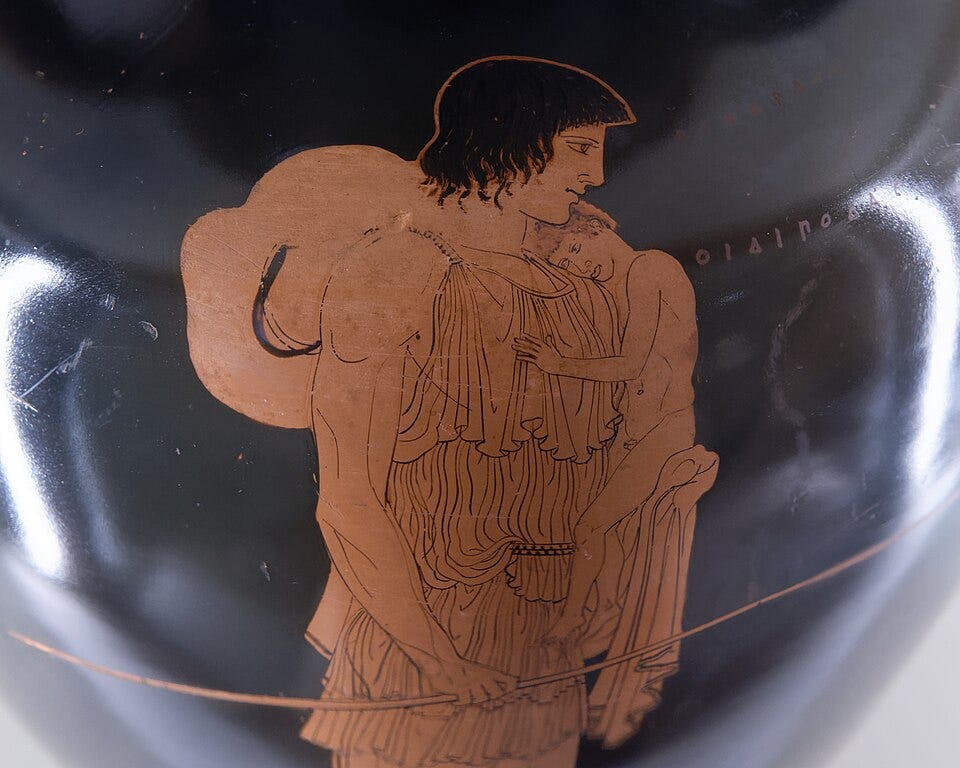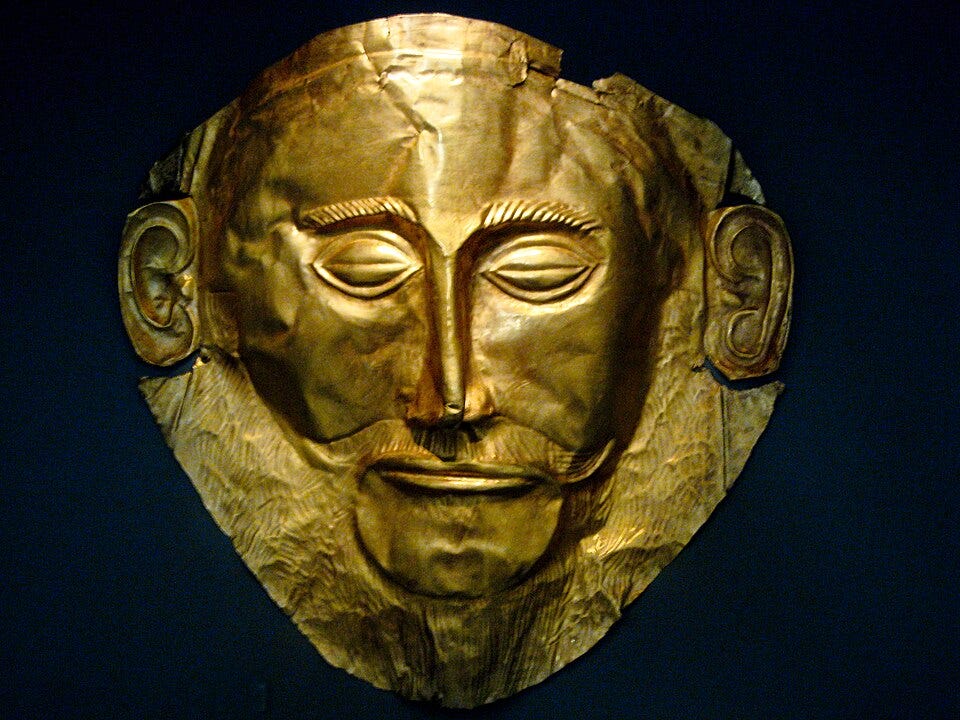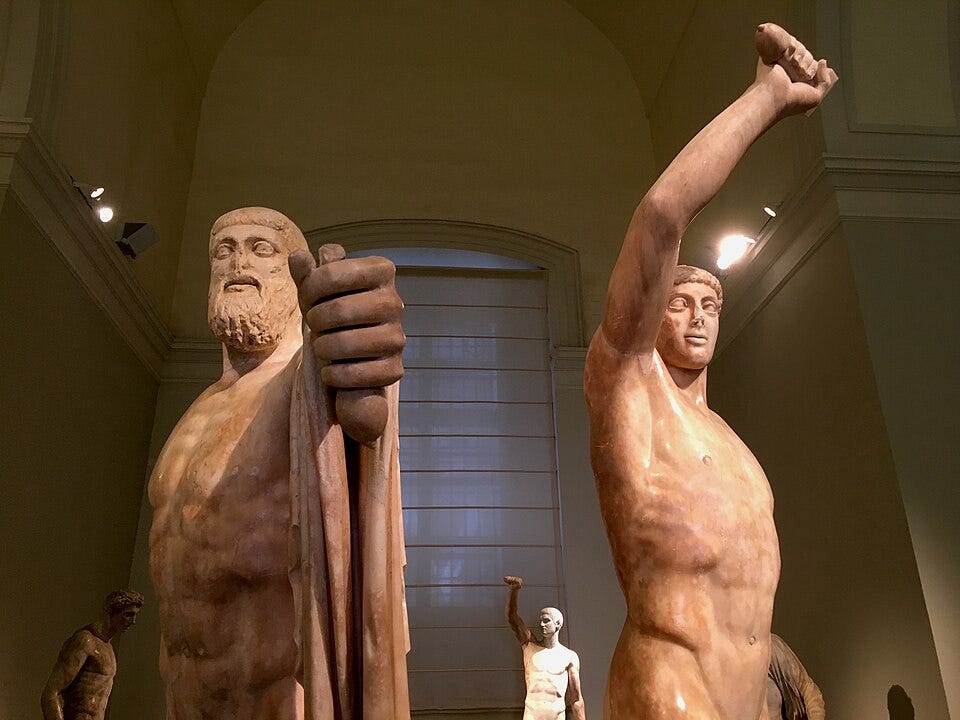This post is a continuation of my substack on the Iliad. All proceeds from the substack are donated to classics adjacent non-profits on a monthly basis. Last year this substack provided over $2k in charitable donations. Don’t forget about Storylife: On Epic, Narrative, and Living Things. Here is its amazon page. here is the link to the company doing the audiobook and here is the press page.
Od. 17.246
“Bad shepherds ruin their flocks.”
… αὐτὰρ μῆλα κακοὶ φθείρουσι νομῆες.
During his argument with Agamemnon in book 1 of the Iliad, Achilles’ rage increases with each conversational turn. Before he throws down the scepter and withdraws from the coalition—thus driving the action of the first two-thirds of the epic—Achilles insults Agamemnon multiple times.
Iliad 1.226-231
“Drunkard with a dog’s eyes and a dear’s heart:
Never have you dared to arm yourself to go to war with the army
Nor to join the ambush with the best of the Achaeans
Since your heart knows that this is your end.
No, really, it’s much easier to range through the wide host of the Achaeans
And steal the goods of anyone who speaks against you.
You’re a people-eating king who rules over nobodies.”οἰνοβαρές, κυνὸς ὄμματ’ ἔχων, κραδίην δ’ ἐλάφοιο,
οὔτέ ποτ’ ἐς πόλεμον ἅμα λαῷ θωρηχθῆναι
οὔτε λόχον δ’ ἰέναι σὺν ἀριστήεσσιν ᾿Αχαιῶν
τέτληκας θυμῷ· τὸ δέ τοι κὴρ εἴδεται εἶναι.
ἦ πολὺ λώϊόν ἐστι κατὰ στρατὸν εὐρὺν ᾿Αχαιῶν
δῶρ’ ἀποαιρεῖσθαι ὅς τις σέθεν ἀντίον εἴπῃ·
δημοβόρος βασιλεὺς ἐπεὶ οὐτιδανοῖσιν ἀνάσσεις·
The insults in this speech are culturally shaped, as in most invective. Calling Agamemnon a drunkard impugns his self-control. In the cultural metaphors of animals, having a dog’s eyes most likely means he is greedy. A deer’s heart indicates that Agamemnon is a coward, a theme Achilles expands on in the next three lines. These insults are mostly personal in nature, by which I mean that Achilles is attacking Agamemnon’s character. He shifts, however, to focus on Agamemnon as a ruler. The pivot is an (implied) explanation on why Agamemnon does not join the fight himself: he doesn’t need the reward of acting up to the cultural standards of a brave man, because he can just steal his goods from other people. Achilles caps the entire section by moving from the personal to the political: Agamemnon is a “people-eating king who rules over nobodies”.
I don’t think that the general sense of this line requires much explication—I can’t remember anyone in my classes ever struggling to make sense of it. But there are some broader associations if we look into expectations for leadership in Greek epic and archaic poetry in general. My suspicion has always been that to understand the full force of this insult, we need to consider the broader metaphor for leadership in Greek epic, “the shepherd of the host” (*poimên laôn).
Often, I think we see the phrase as indicating a simple relationship. The metaphor is somewhat paternalistic: as a scholiast notes, there is concern involved “for it is right that a ruler be as careful of the led as the shepherd is of his sheep.” (Schol. ad Il. 285b “The shepherd of the host”: For it is right that the ruler be as careful of the led as a shepherd is of his sheep.” ex. <ποιμένι λαῶν:> δεῖ γὰρ τὸν ἄρχοντα τοσοῦτον εἶναι τῶν ἀρχομένων προνούστερον ὅσον ποιμένα προβάτων. λέγει δὲ τὸν ᾿Αγαμέμνονα.) Certain implications are clear in this concept: a leader must care for his people and protect them from external threats. But, as the general and philosopher Xenophon has it in his Memorabilia, it is not enough that a shepherd keep his flock safe, but he must also ensure its prosperity.
Xenophon, Mem. 3.2.1
“When he met a men who had been selected general, Socrates said why do you think that Homer call Agamemnon the shepherd of the host? Do you think that it is because it is right that he take care as a shepherd that his sheep be safe, that they have what they need, and that the reason they are raised will turn out well—that a general must act so that his people are safe, they have what they need and that they will obtain why they became an army? They went on an expedition so that, by overcoming their enemy, they might be happier?
…For a king is selected not so that he may care for himself well, but so that those who chose him may do well because of him. And all go to war so thet their life may be as good as possible, and they choose generals for this reason, so that they might have leaders to this end.”
᾿Εντυχὼν δέ ποτε στρατηγεῖν ᾑρημένῳ τῳ, Τοῦ ἕνεκεν, ἔφη, ῞Ομηρον οἴει τὸν ᾿Αγαμέμνονα προσαγορεῦσαι ποιμένα λαῶν; ἆρά γε ὅτι, ὥσπερ τὸν ποιμένα δεῖ ἐπιμελεῖσθαι, ὅπως σῶαί τε ἔσονται αἱ οἶες καὶ τὰ ἐπιτήδεια ἕξουσι καί, οὗ ἕνεκα τρέφονται, τοῦτο ἔσται, οὕτω καὶ τὸν στρατηγὸν ἐπιμελεῖσθαι δεῖ, ὅπως σῶοί τε οἱ στρατιῶται ἔσονται καὶ τὰ ἐπιτήδεια ἕξουσι καί, οὗ ἕνεκα στρατεύονται, τοῦτο ἔσται; στρατεύονται δέ, ἵνα κρατοῦντες τῶν πολεμίων εὐδαιμονέστεροι ὦσιν.
[3] καὶ γὰρ βασιλεὺς αἱρεῖται οὐχ ἵνα ἑαυτοῦ καλῶς ἐπιμελῆται, ἀλλ᾽ ἵνα καὶ οἱ ἑλόμενοι δι᾽ αὐτὸν εὖ πράττωσι: καὶ στρατεύονται δὲ πάντες, ἵνα ὁ βίος αὐτοῖς ὡς βέλτιστος ᾖ, καὶ στρατηγοὺς αἱροῦνται τούτου ἕνεκα, ἵνα πρὸς τοῦτο αὐτοῖς ἡγεμόνες ὦσι.

In Homeric poetry, as Johannes Haubold observes, “Failure of the shepherd is the rule not the exception” (2015, 20). And there is a clear connection in Homeric language between the failure of a king and the destruction of his people: this criticism is essential to the characterization of both Agamemnon and Hektor. I also suspect that there is something dangerous in the metaphor that reifies social relationships: the sheep never get to become the leader. In addition, at its base, the relationship between a shepherd and flock is about consumption: even the kindest shepherd shears his sheep for wool; the noblest shepherd slaughters lambs for their meat. If a leader is a shepherd and a bad leader causes the ruin of his people, we can imagine cognitive metaphors of eating and excessive consumption combining with potential associations of the shepherd. It should not then be difficult to imagine that a an insult resulting in the image of a king eating his people.
When Achilles announces “You are a people-eating king who rules over nobodies” the attack capitalizes upon aspects of the king as a good shepherd and a failed leader. The king here is becomes an excessive eater, recognized by ancient commentators who gloss the word dêmoboros as meaning “one who eats the people’s common goods” (Apollonius Sophista s.v. δημοβόρος: “People-eater: one who eats the people’s common goods” δημοβόρος ὁ τὰ τοῦ δήμου κοινὰ κατεσθίων) Another scholiast makes the metaphor more economically specific, explaining it as the act of “making the common goods your own” (Schol bT ad. Il. 1.231ex “This disturbs the masses. For the most serious accusation is making the common goods your own.” δημοβόρος: κινητικὰ ταῦτα τοῦ πλήθους· μεγίστη γὰρ κατηγορία τὸ σφετερίζεσθαι τὰ κοινά.) In a world where “money makes the man”, individuals who have no goods are concretized as nobodies, individuals of no account as inhuman, perhaps, as the metaphorical shepherd’s flocks. Such a transformation implicitly justifies their mistreatment and slaughter.
I think the metaphor has deeper reach still: the noun dêmoboros is verbalized in the scholia when it refers to the Trojan “hope of destroying the people” (dêmoborêsai: Schol. bT ad Il. 18.312 “the hope of destroying the people” ἡ ἐλπὶς τοῦ δημοβορῆσαι.) This is an enemy’s action, not a leader’s.
The commentator Eustathius, for example, sees the actions as going both ways: rulers can eat the possessions of their people, but the people can consume their rulers’ possessions too (which seems to be the danger in the Odyssey). Eustathius, however, echoing Xenophon’s focus on the shepherd’s virtue, emphasizes the consumptive power of a king when he offers the parallel from Hesiod, “gift-devourer” (δωροφάγοι) and mentions in passing that Agamemnon is also criticized for drinking and eating in excess.
Eustathius, Commentary on the Iliad 1.143.27
“The insult “people-devouring king” is aimed especially at moving the people and provoking Agamemnon to Anger. Just as the term “gift-devourer” emphasizes the evil of taking bribes, just so here the term dêmoboros highlights the injustice which is more subtly announced in the phrase “deprive one of gifts”. Note as well that Agamemnon is maligned not just for drinking [being “wine-heavy”] but also for eating.”
σφόδρα δὲ κινητικὸν τοῦ δήμου τὸ δημοβόρος βασιλεύς καὶ ἐρεθιστικὸν εἰς θυμόν. ὥσπερ δὲ παρ’ ῾Ησιόδῳ τὸ δωροφάγοι ἐπιτείνει τὸ κακὸν τοῦ δωροληπτεῖν, οὕτω κἀνταῦθα τὴν ἀδικίαν τὸ δημοβόρον, ὃ ἠρέμα ὑπελαλήθη καὶ ἐν τῷ «δῶρ’ ἀποαιρεῖσθαι». ὅρα δὲ καὶ ὅτι οὐ μόνον οἰνοβαρὴς ὁ ᾿Αγαμέμνων σκώπτεται ἀλλὰ καὶ βορός.
In Hesiod’s Words and Days, kings who offer crooked judgments are called bribe-eating (221 and 264),[2] another usage framed as an issue of virtue by ancient scholars who believe that kings should be above the desire for money.
Works and Days 219-223; 263-266
“Oath runs immediately from crooked judgments.
And a roar rises from wounded Justice where men strike,
Bribe-eating men who apply the law with crooked judgments.αὐτίκα γὰρ τρέχει ῞Ορκος ἅμα σκολιῇσι δίκῃσιν·
τῆς δὲ Δίκης ῥόθος ἑλκομένης ᾗ κ’ ἄνδρες ἄγωσι
δωροφάγοι, σκολιῇς δὲ δίκῃς κρίνωσι θέμιστας·
“Guard against these things, kings, and straighten your stories,
Bribe-eaters, forget about your crooked rulings completely.
Who fashions evil for another man brings it on himself.
The vilest end comes for the man who has made evil plans.”ταῦτα φυλασσόμενοι, βασιλῆς, ἰθύνετε μύθους,
δωροφάγοι, σκολιέων δὲ δικέων ἐπὶ πάγχυ λάθεσθε.
οἷ αὐτῷ κακὰ τεύχει ἀνὴρ ἄλλῳ κακὰ τεύχων,
ἡ δὲ κακὴ βουλὴ τῷ βουλεύσαντι κακίστη.
A scholiast explains that there is a divine prerogative for kinds to ensure the wealth of their people.
Schol ad Hes. Prolg. 125
“He says this educationally, answering to the kings who should make a great effort to make people prosperous even though some of them take bribes. Not only this, he says clearly that if the kingly right is bestowed by the gods to do good, then it is right that kingly men be givers of wealth, and to expunge wrong doing, including a desire for money, for which they should be leaders for others according to the will of the gods.”
ΠΛΟΥΤΟΔΟΤΑΙ. Τοῦτο παιδευτικῶς εἶπεν, ἀποκρινόμενος πρὸς τοὺς βασιλεῖς, οἳ πολλοῦ δέουσιν εὐπόρους ποιεῖν τοὺς ἀνθρώπους δωροφάγοι τινὲς ὄντες. Μονονουχὶ λέγει σαφῶς, εἰ γέρας ἐστὶ βασιλικὸν προτεινόμενον ὑπὸ τῶν θεῶν τὸ ἀγαθοποιεῖν, καὶ πλουτοδότας εἶναι δεῖ τοὺς βασιλικοὺς ἄνδρας, καθαρεύειν τε πάσης κακουργίας, καὶ τῆς τῶν χρημάτων ἐπιθυμίας, ὧν εἰσιν ἄλλοις χορηγοὶ κατὰβούλησιν τῶν θεῶν.
The only other close parallel for the term people-eating king comes from the archaic elegist Theognis:
Theognis 1179-1182
“Kyrnus, revere and fear the gods. For this restrains a man
From doing or saying anything sinful.
Put a people-eating tyrant to rest however you want—
No criticism will come from the gods for that.”Κύρνε, θεοὺς αἰδοῦ καὶ δείδιθι· τοῦτο γὰρ ἄνδρα
εἴργει μήθ’ ἕρδειν μήτε λέγειν ἀσεβῆ.
δημοφάγον δὲ τύραννον ὅπως ἐθέλεις κατακλῖναι
οὐ νέμεσις πρὸς θεῶν γίνεται οὐδεμία.
Theognis stops just short from saying there is a divine mandate to overthrow kinds who consume their people. Instead, he uses the traditional phrase “there’s no criticism…” to indicate it is an acceptable if not necessary action.
N.B. Some of this draws on my article “Shepherds, Fathers, and Ships: Ancient Greek Leadership Metaphors and Some Consequences,” Science et Esprit 74: 164–79.
Some things to read
Agamben, Giorgio. 2015. Stasis: Civil War as a Political Paradigm. Translated by Nicholas Heron. Redwood City, CA.
Barker, E. T. E. 2009. Entering the Agôn: Dissent and Authority in Homer, Historiography and Tragedy, Oxford.
Benveniste, Émile. 1969. Le vocabulaire des institutions indo-européennes. 1. Économie, parenté, société. Paris: Les Éditions de Minuit.
Brock, Roger. 2013. Greek political imagery from Homer to Aristotle. New York ; London: Bloomsbury.
Drews, Robert. 1983. Basileus: The Evidence for Kingship in Geometric Greece. New Haven.
Elmer, David. 2013 The Poetics of Consent: Collective Decision Making and the Iliad, Baltimore.
Hammer, Dean. 2002. The Iliad as Politics: The Performance of Political Thought. University of Oklahoma Press.
Handl, Sandra & Schmid, Hans-Jörg. 2011. Introduction: Metaphor, Metonymy and Conceptual Blending. 10.1515/9783110238198.1.
Johannes Haubold. Homer’s People: Epic Poetry and Social Formation. Cambridge: 2000.
Huntzinger, Jonathan David. The end of exile: a short commentary on the shepherd/sheep metaphor in exilic and post-exilic prophetic and Synoptic Gospel literature. [S. l.]: [s. n.], 1999.
Lakoff, Georg and Johnson, Mark 1980. Metaphors We Live By. Chicago.
Loraux, Nicole. 2006. The Divided City: On Memory and Forgetting in Ancient Athens. Translated by Corinne Pache and Jeff Fort. New York.
Macé, Arnaud. 2017. “Purifications et distributions sociales : Platon et le pastorat politique. Philosophie antique - problèmes, renaissances, usages” Presses universitaires du Septentrion, Platon et la politique: 101–123.
Marks, Jim. 2008. Zeus in the “Odyssey.” Hellenic Studies 31. Washington, DC.
Muellner, L. C. 1996. The Anger of Achilles: Mēnis in Greek Epic. Ithaca, NY.
Naiden, Fred. 2012. Smoke Signals for the Gods: Ancient Greek Sacrifice from the Archaic through the Roman Period. Oxford.
Petit, A. 1999. “Le pastorat ou l’impossible raccourci théologico-politique.” dans E. Cattin, L. Jafro & A. Petit (éd.), Figures du théologico-politique, Paris: 9–24.
Vernant, Jean-Pierre., Detienne, Marcel., Durand, Jean-Louis. The cuisine of sacrifice among the Greeks. Chicago: University of Chicago Press, 1989.
Uhlig, Anna. “Sailing and singing: Alcaeus at sea.” Textual events : performance and the lyric in early Greece. Eds. Budelmann, Felix and Phillips, Tom. Oxford: Oxford University Pr., 2018. 63-92
Zanker, Andreas. 2019. Metaphor in Homer: Time, Speech, and Thought. Cambridge.






What do you make of the Wilson translation of this line “Cannibal king, you eat your people up,” which struck some people as weird as opposed to the less evidently weird sounding translations other English translators used?